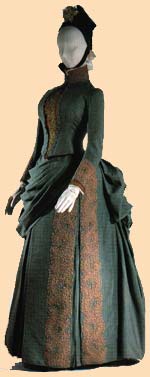The costume designer is the creative artist responsible for the look of the characters and its contribution to the play's inner meaning. Modern costume design includes a character's garments, accessories, hairstyle or wig, makeup, and masks, if required. 
As a design element, costumes help establish a character's social class, economic status, age, and occupation. They can also assist in identifying a play's time period, geographic location, weather, and time of day.
During the Renaissance (14th century to 17th century), signature costumes and masks readily identified the stock characters of commedia dell'arte. From ancient Greek times to the mid-19th century in Europe, actors wore clothing of their time.
By the 20th century, the complex demands of stage production required specialized, trained costume designers to design, select, and control the elements of clothing as they relate to the total production design. One award-winning costume designer has said that costumes serve a producer's vision, a director's viewpoint, and an actor's comfort. In the commercial theater, costume designers have their own design studios and utilize construction shops with managers, cutters, drapers, and stitchers to execute their designs for Broadway musicals or regional productions.
Costume designers label makeup straight, character, or fantasy, depending on the way it is used. Straight makeup highlights an actor's normal features and coloring for distinctness and visibility. Character or illustrative makeup transforms an actor's features, usually with false noses, wrinkles, eyelashes, eye pouches, teeth, or facial hair. In Asian theater, bold makeup is often used. In China's Beijing Opera, for example male roles require makeup and beards, while most female roles require white painted faces with deep red and pink shading around the eyes.
In all instances, makeup, wigs, and hair require the costume designer's approval.

Tailored wedding ensemble
Louise Whitfield wore this wool traveling costume n April
22,1877
when she married Andrew Carnegie
| Home | Design | Art | Ballet |
| Adolphe Appia | Jo Mielziner | ||
| Gordon Craig | |||